Regain Review: Best online relationship counseling?
Find out the pros, cons, and important details of Regain’s online couples therapy service.

Relationships can be some of the most rewarding and fulfilling parts of our lives, but they also present their fair share of unique challenges. If you’re experiencing a difficult time in your relationship, know that you’re not alone. In 2017 MidAmerica Nazarene University surveyed 1,000 engaged, married, and divorced people to gain a better insight into the statistics of marriage or couples’ counseling. Almost half of the respondents (49%) stated they’d been to couples counseling before, with nearly a quarter (23%) reporting that they attended counseling before engagement or marriage.1
Interestingly, 58% of respondents said they’d be open to “virtual counseling” using services over the internet. While there are many online therapy options available nowadays, a few of them focus on or specialize in couples therapy, such as Regain.
Regain is an online relationship therapy platform that aims to help people overcome roadblocks to resolving or working on their relationship and marital concerns by:
- Facilitating easy access to relationship counselors
- Circumventing scheduling conflicts
- Reducing the potential stress of attending conventional in-person counseling
The main way Regain does this is by allowing individuals or couples to access counseling (via chat room and video) through their computer or smartphone whenever and wherever it suits them.
We thoroughly researched and tested Regain so that you can make an informed decision on whether or not it’s right for you and your relationship.
Our Findings
Pros
- Flexibility to access counseling from anywhere with an internet connection
- All counselors are licensed, trained, experienced, and accredited
- Both partners can participate in counseling at no extra cost
- No limit to the number of messages between you and your counselor
- Three-way sessions mean you and your partner don’t have to be in the same location
- Some therapists specialize in additional topics like parenting, family conflicts, and more
- No software downloads are necessary; sessions are through your web browser
Cons
- Lump sum billing reduces perceived accessibility
- Cost varies by location, preferences, and therapist availability
- Not suitable for counseling ordered by courts or other authorities
- Your partner can see all messages sent between you and your counselor
Regain provides flexible relationship counseling from licensed professionals at a more affordable rate than many out-of-pocket therapy options. The ability to message your therapist, in addition to audio or video sessions, adds a layer of convenience for those with busy schedules. Regain is also a potentially ideal solution for long-distance couples with its 3-way conference call functionality during live sessions. However, its once-monthly billing cycle may limit accessibility for some people.
In this Review
Why you should trust us
Over the past two decades, Innerbody Research has helped tens of millions of readers make more informed choices to live healthier, happier lives. To bring you unbiased information, we extensively research and test each health service or product we review.
For this review of Regain, our team read dozens of studies and spent over 224 hours testing and researching Regain and its close competitors. When evaluating products and services, we base our opinions on their adherence to quality, the latest medical evidence, and current health standards.
Additionally, this review of Regain, like all health-related content on this website, was thoroughly vetted by one or more members of our Medical Review Board for accuracy.
How we evaluated Regain
In order to give you the most insight into Regain’s clinical platform, we focused on four major criteria — the quality of therapy, how much it costs, how easy the platform is to use, and how your information is handled. Of these, the quality of the therapy offered is the most important aspect of our evaluation; if you want to put your time and hard-earned money into something as important as bettering your relationship, it should be a worthwhile investment.
Quality of therapy
Regain boasts thousands of licensed mental health professionals, meaning you’re almost guaranteed to find someone who fits your needs. While Regain tries from the outset to “match you to an available therapist who fits your objectives, preferences, and the type of issues you are dealing with”, there’s always the chance that the fit just isn’t there. The service allows and encourages its providers to use their preferred therapeutic modality and interventions, so it may take a few tries to find someone whose approach works best for you. And you can swap counselors as often as necessary until you find the perfect match for your needs.
No matter who you’re matched with, all of the counselors on Regain possess Master’s or Doctoral degrees in their field, have at least three years and 1,000 hours of clinical experience, and are licensed to practice in their state. All of Regain’s therapists have expertise in relationship therapy, but some have additional areas of focus, like parenting, depression, anxiety, stress, trauma, grief, LGBTQ+ matters, substance use, and more.
And if you’re curious about the reviews for a specific therapist, you can visit Regain’s review page to read feedback from clients. If you click “more reviews” by a counselor’s name, you can view the therapist’s testimonials, their “About Me” section, specialties, and licensing information.
Most of Regain’s competitors, like Ritual and Growing Self, also require their therapists to have a Master's or Doctorate degree. However, some options out there don’t require this. Many of the coaches for RelationshipHero, for instance, possess bachelor's degrees, associate degrees, or certifications in place of a degree.
Cost
Therapy can be really expensive, and cost is one of the biggest barriers many face when trying to access mental health services.2 If a company offers its services at an affordable price, accepts insurance, offers financial aid, or provides a sliding scale payment option, then it’s much more accessible.3
Regain’s prices have recently increased from the previous rate of $40-$70 per week to $65-$90 per week. The rates the company advertises can feel a bit deceptive considering you aren’t paying that price each week; you’re billed monthly for the entire cost of four weeks. As with most counseling, Regain isn’t cheap — it can cost up to $360 every month. This cost varies based on factors like your location and financial situation. When we reached out to Regain’s customer support to ask about why location affects pricing, we didn’t hear back.
The company also doesn’t accept FSA/HSA or take insurance. That said, it at least doesn’t charge a different rate for individual versus couples counseling, which is common practice. And while Regain is still somewhat less expensive than a traditional therapist’s out-of-pocket costs (which can cost anywhere from $50-$250 per session), the lump-sum charge instead of weekly installments can affect how accessible the service is to some people.4 5 We wish Regain would offer payment plans as it did in the past. This change ultimately deducted points from our rating for the service’s cost-effectiveness.
If you are struggling financially, Regain does offer an immediate-response financial aid application that can give you a nice discount depending on factors like student status, employment, income, if you live in a rural or urban area, and more. But you should still be prepared to pay a couple of hundred dollars per month, even with financial aid. Also, even though you can cancel your subscription whenever you want, you won’t be refunded any money from your last bill (even if it’s early in the subscription period).
Ease of use
If a service is frustrating to navigate and use, then you may not be as likely to stick with it, even if it would ultimately be helpful. Additionally, how simple it is to get assistance from customer service matters.
Regain aims to make getting relationship counseling easy, and it does a pretty good job at this. All you need to do is take a survey on your goals and background information; the service will automatically match you with a counselor who meets your needs within a couple of days at the latest (you may have a counselor matched to you in as little as a few hours). The website is relatively minimalistic and streamlined, so there’s not much excess for you to have to navigate around.
No matter where you are in the world, as long as you have a reliable internet connection (without censorship of topics like LGBTQ+ concerns), then you can access Regain. And for busy couples or long-distance relationships, Regain allows you, your partner, and your therapist to connect in a 3-way conference call. This means you don’t have to be in the same room, state, or country as your partner to access couples counseling on the platform.
When it comes to customer care, there’s only one way to get in contact with Regain’s customer support: an in-browser email form via the “Contact” button on the upper right of the website. This is almost identical to how competitors like Talkspace and Ritual handle customer support inquiries. We do wish more of these services at least offered a live chat option to facilitate quicker communication. One competitor of Regain that stands out by offering some of the most versatile customer service contact options is Growing Self, which allows you to use live chat, email, text, or a phone call to get in touch with the client services team.
Other than the “Contact” option, Regain does have an FAQ page. While you can get some quick answers from the FAQ page, getting help from someone other than your counselor isn’t particularly easy when the only other option is the online contact form. Additionally, any other administrative tasks, like changing counselors or requesting a copy of all of your personal data, are done through online forms similar to the contact form and are handled by staff within 48 hours.
We did run into a bit of an inconvenience when trying to use Regain’s video service (which uses Vonage’s video API to run through your web browser). While the internet speed was more than adequate for a video call, Regain’s video test said we’d be better off using a phone for our session. The image below shows our internet speed test results (a wired connection that’s considered “very fast”) and the error we received from Regain.

When going to the “advanced troubleshooting” link, you’re directed to the Vonage Video API pre-call test page, which didn’t find any issues in our case. So, if you use Regain, be prepared to run into some potential tech issues. And, if you do experience issues on a computer and need to use your phone, know that Regain makes you use its app — you can’t use Regain on a mobile web browser for video sessions.

Handling of your information
Last but not least, we looked at how Regain handles your info. Therapy is a very personal experience, and people often divulge sensitive details about their lives.
And this is where things get a little iffy with Regain. There are some aspects the company handles well, like getting its platform certified by HITRUST — the Health Information Trust Alliance.6
However, while that's reassuring, Regain's policy language is not as strong or explicit as major competitor Talkspace, for instance. And Regain’s parent company, BetterHelp, was recently issued a complaint by the FTC for mishandling user data and violating its own policy.
Regain (along with other BetterHelp businesses) was directly mentioned in the FTC’s complaint. However, you can take action to change some important settings at the bottom left of the Regain website. The picture below has this link highlighted.

When you click on that link, a pop-up appears with options you can modify.

Those options are valuable, and we're glad that Regain provides them, but it's not as good of an experience as what you find on competing websites when it comes to guarding your information.
You can request a copy of your personal data or ask that it be removed by either emailing Regain at contact@regain.us or by finding the option under My Account (or Account Settings) > Your Personal Information. We’ve highlighted the options in the image below.
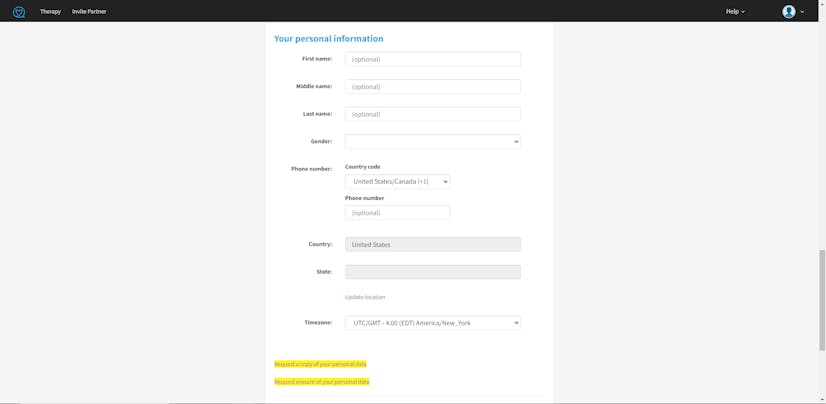
If you do not request your data be removed, Regain will retain your data for ten years, even if you never started therapy. And, even if you do request removal, some data may still be kept for that 10-year period.
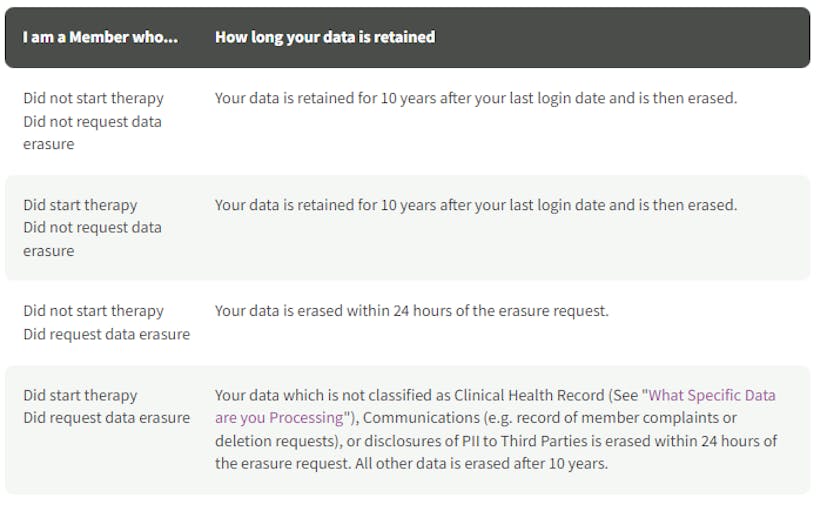
With your counselor or therapist, all of your information remains as under wraps as in any therapy setting for as long as legally possible. Regain therapists are legally required to report instances of child, elder, or dependent adult abuse. Your therapist also must do so if you are at imminent risk of harming yourself or someone else. All of this aligns with standard mandated reporting laws in the United States.
Regain lets you use a nickname, but the service will still request your contact information for emergency situations. Some therapists may also require additional details from you depending on their license or accreditation guidelines.
Lastly, if you do invite your partner to therapy, note that your Regain account is a shared account, and your partner will have the ability to see whatever you write in the chat room. You do have the option to "shred" (or remove) messages, however.
What is couples therapy?
Couples therapy — also commonly known as couples counseling or marriage counseling — is a short-term and problem-oriented form of psychotherapy designed to help couples, married or not, resolve issues and concerns in a healthy way.7 Some common reasons couples may attend therapy include:8
- Communication problems
- Sexual difficulties
- Financial issues
- Conflicts regarding children
- Infidelity concerns
- Differing expectations for the future
According to the American Association for Marriage and Family Therapy (AAMFT), the average number of sessions necessary for couples therapy is 11.5, with 65.6% of cases (of both couples and family therapy) completed within 20 sessions.9
Does couples therapy work?
The AAMFT states that, post-treatment, nearly 90% of clients report better emotional health and roughly 75% report improvements in their relationship.9 Research backs up this claim; a 2011 study found that 70% of couples receiving treatment were positively impacted. And a separate 2017 study reported that emotionally focused couple therapy (EFT) increased couples’ relationship satisfaction while decreasing relationship-specific attachment anxiety.10
Is virtual couples counseling effective?
With online therapy becoming as widespread as it has in a relatively short amount of time, it’s only natural to question the efficacy of mental health services delivered via the internet. Multiple studies suggest online therapy may be just as effective as in-person therapy (if not more effective, in some cases).11 12 13
When looking into virtual couples counseling, specifically, the evidence suggests couples find significant value in it. For instance, a 2020 study reported that (despite initial concerns) video conferencing actually helped couples feel a “greater sense of control and comfort,” allowing for enhanced focus on the therapy process through effective connections with their therapist.14
What is Regain?
Founded in 2016, Regain is a branch of the online therapy platform BetterHelp, delivering entirely online relationship counseling services through messaging, video, or phone sessions using a computer, tablet, or smartphone. Regain is home to over 10,000 licensed and accredited therapists, all with experience in relationship counseling. You can choose to partake in therapy on your own or with your partner using a joint account.
The company states that they aim to “change the way people get help facing relationship challenges by providing convenient and affordable access to a licensed therapist.”
Creating an account
To get started with Regain, you need to create an account. As with many competitors (like Ritual, Ours, and Talkspace), account creation begins with a questionnaire that asks some deeper questions about the concerns you’re experiencing and gathers broad background information that the platform needs to know about you and your partner. You can also specify any preferences you have about your counselor (such as gender, LGBTQ+, spirituality, and so on).
The questionnaire is checkbox-style, so while it’s thorough, it only takes about five minutes to complete. If you and your partner plan to attend counseling together, you’ll be able to send them a link to join through an email. The two of you will share one account.

After you’ve finished the questionnaire, you’ll be prompted to enter your email address and the name you want the counselor to call you — your legal name is not necessary here, so you can use your preferred name or a nickname. You’ll be directed to a payment page next, after which Regain will match you with a counselor. Upon matching, your subscription will officially begin.
Insider Tip: If you back out of sign-up before paying, Regain will still match you with a counselor and email you this info. You can’t access any of the therapy services without payment, but this allows you to see if the match sounds compatible before paying.
Getting started with a counselor
Your subscription of $260-$360 (without discounts or financial aid) pays for a “room” with your counselor. Here, you can send them messages whenever you wish and partake in live sessions via chat, phone, or video call. Most of your communications will take place over chat, where both you and your partner can see all of the messages. These text conversations do not take place in real time, and communication times with your counselor can vary. If you want to speak with your counselor one-on-one, you can schedule a phone or video call with them. You and your partner can both join in these sessions using Regain’s conference call functionality.
While you get four live sessions per monthly billing cycle, keep in mind that they don’t roll over to the next month (or billing cycle) if left unused. So be sure to take full advantage of these each month.
Are Regain counselors qualified?
All counselors on Regain must be licensed to practice in their home state and must have:
- A Master’s degree (LMFT, LCSW/LMSW, LPC, LPCC) or Ph.D./Psy.D.
- At least three years and 1,000 hours of experience.
- State accreditation as psychologists, counselors, social workers, or therapists.
Talkspace has similar requirements for its therapists, requiring licensure and credentials in accordance with the National Committee for Quality Assurance (NCQA). RelationshipHero, on the other hand, doesn’t require any of this.
While every Regain counselor’s practice history is different, they all have experience with treating couples. And many of Regain’s therapists have additional specializations or focus areas, such as:
During the sign-up questionnaire, you can also choose the expectations you have from your therapist, such as assigning homework, mediation, goal setting, and more. This can help you better tailor your relationship therapy experience to your unique circumstances and needs.
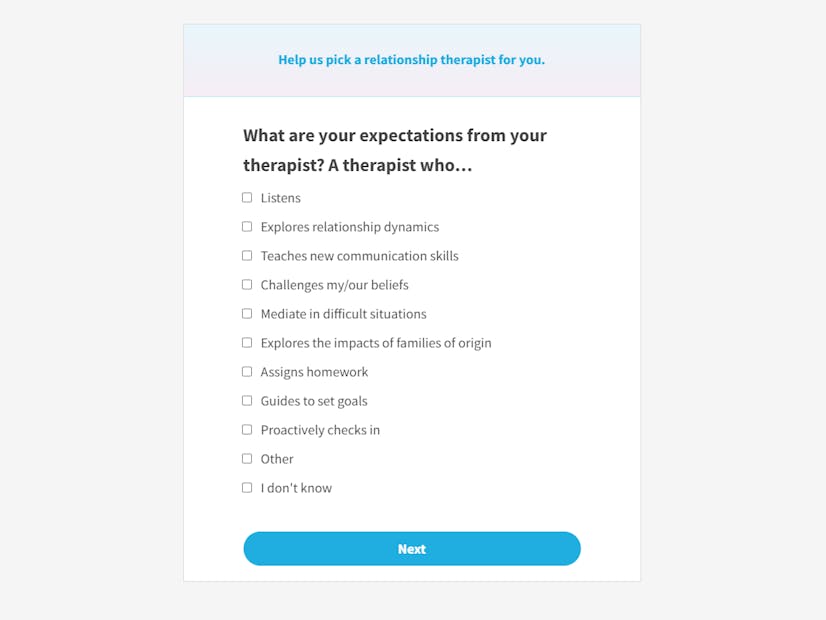
Insider Tip: To check a therapist’s profile (including license info and specialties), paste this link into your browser — https://www.regain.us/first-last/#testimonials — and replace “first” with their first name and “last” with their last name, then hit enter on your keyboard to go to the page.
Who shouldn’t use Regain?
Relationship counseling can help people in a myriad of situations. You might be seeking an open space to discuss communication concerns, or you might need help facilitating an amicable separation. However, there are a few cases in which you should seek help elsewhere:
- You’re a minor or under the care of a legal guardian.
- You are in an urgent crisis or an emergency situation.
- You are required to undergo therapy by either a court order or any other authority.
- You’re in an abusive relationship or are otherwise concerned for your safety in the relationship.15
- You don’t have reliable internet access.
In these circumstances, we recommend that you seek counseling in person. If you are currently in a crisis or experiencing thoughts of suicide, please reach out to a friend or loved one, text a phone crisis line (text HOME to 741741 or call 988), or go to your local emergency department. The American Psychological Association also offers a page listing various crisis hotlines.
What others reviewers say
In our testing and research, we find Regain to be a worthy option for your consideration, if you’re looking for convenient online couples therapy. Elsewhere, customer reviews are generally positive. With over 9,200 ratings, Regain’s app gets 4.8 out of 5 stars in Apple’s App Store. Though it’s not accredited with the Better Business Bureau (BBB), Regain has a rating of 4.08 out of 5 stars from 31 reviews and has resolved 22 complaints over the past year. Complaints most commonly center around billing. Meanwhile, with 143 reviews, Trustpilot’s average rating for Regain is 3.4 out of 5 stars.
What services does Regain offer?
While the company is based in the United States, Regain’s services are available worldwide. No matter where you are, you can work with a therapist for individual or couples counseling. The subscription lasts as long as you need it to, provided that you’re still paying your monthly fee. You and your counselor can discuss any relationship issue together, no matter how large or small it may seem.
Since Regain is such a large organization, it has therapists who specialize in every sort of mental health concern or topic. However, Regain is specifically designed for relationship counseling, so if your biggest concerns are other topics, you may find better results in seeking out another service. For example, some services like Talkspace offer a broad range of counseling services (for teens, veterans, couples, individuals, and so on).
Individual relationship counseling
If you can’t or don’t want your partner to be involved, Regain offers individual relationship counseling. Here, you can work on your relationship one-on-one with a counselor to figure out the best strategies for you.
Regain acts as a platform to connect clients to counselors, but does not directly employ the counselors. (They work as independent contractors for the platform.) Before you start sessions — and as you progress through counseling — you’ll be able to read information about your counselor. This information includes:
- A multi-paragraph summary of their experience, techniques, and specialties
- Specific conditions and circumstances they work with
- Their clinical approaches
- Preferred methods of communication
- Licensing information, including expiration date
- Degrees and educational information
- Real client testimonials (only the positive reviews)
As with traditional face-to-face therapy, each counselor is individual and employs different clinical approaches, techniques, and materials to help you through the process. Some counselors have preferred methods of communication (such as live phone calls), some may offer worksheets or homework assignments, and some may follow your guidance and take a back seat while you lead the discussion. These techniques may or may not work for you, depending on your goals.
If you’re interested in learning more about your therapist, you can go to your account settings from the menu on the upper-right corner of the website to quickly find their profile.
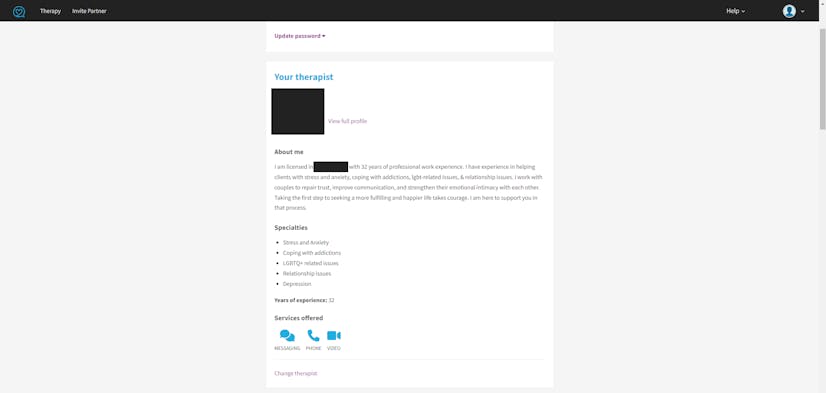
If at any time you feel you’re not getting what you need with your current counselor, you can request a change. Even if you haven’t started counseling, you can change if you feel that the profile of the counselor you’ve matched with doesn’t fit what you are looking for. Regain makes it easy to switch to a different counselor in its service — just click the easy-to-find “change therapist” link under your account settings menu at the top right of the Regain site, fill out a brief form explaining why, and customer service will take care of the rest within 48 hours. Ritual and Talkspace also offer easy switching if the fit isn’t there.

Couples counseling
With Regain, both partners access counseling using the same account. You can choose whether to invite your partner to the counseling from the beginning or have individual counseling first and invite your partner later. Ritual has a similarly flexible approach to partner inclusion; you can join with or without your partner and change this as you go.
When you invite your partner to join your therapy room on Regain, they’ll receive an email explaining what the service is, the name of your therapist, and a link to join. We appreciate that from the very beginning Regain lets you know that everyone in the room can see all messages sent and received.
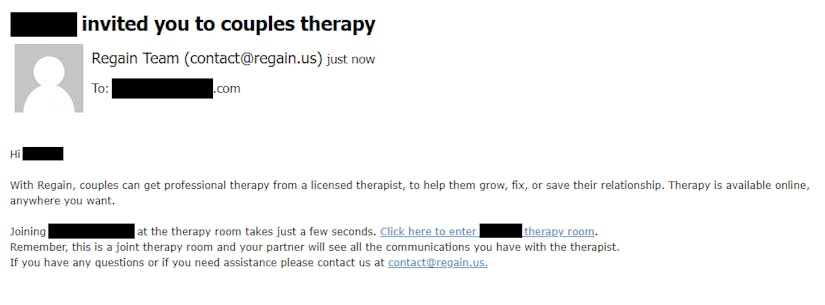
Each partner can have individual sessions with the counselor via live chat, phone, or video. You can also have 3-way conference calls with your counselor and partner using the same mediums as individual sessions.
Messaging and live sessions
Counseling with Regain takes the form of online messages at your convenience, as well as up to four 30-45 minute live chats, phone calls, or video sessions with your counselor per billing cycle (you can check your therapist’s schedule from the calendar drop-down in the left-hand menu). When your counselor has responded to your message, you’ll receive an email or text notification, depending on your preferences. These messages will remain available in your counseling room unless you choose to “shred” them, making it easy to review and reflect on the advice you have received.

There is no limit to the number of messages you can send to your counselor. Your counselor won’t respond to most messages immediately, but they do try to respond within 24 hours. Thanks to this flexibility, you have the option to speak with your counselor when you feel the need to reach out. You and your counselor will work together to find a method and frequency of communication that’s right for you.
Online advice
Regain also features a blog offering general relationship advice and short articles on a wide range of topics, from friendship and minor relationship advice to psychology and body language. Some of these articles are quite light-hearted, while others are more informative, explaining things such as the differences between counseling approaches and psychology terminology.
Online mental health services having blogs is fairly common — Ritual and Growing Self have blogs with content in a similar vein to Regain’s.
How much does Regain counseling cost?
Regain costs between $65 and $90 per week, charged once a month ($260-$360 per month), depending on your location and therapy needs. Previously, Regain allowed you to use a few different payment plan options for your subscription, but it’s moved to a once-a-month subscription service. While this is still a bit less expensive than typical out-of-pocket costs for a therapist, it can still reduce how accessible the service is.4 5
Additionally, as we said under the cost criterion at the beginning of our review, when we reached out to Regain to inquire about the reasons for location affecting cost, we failed to hear back from anyone.
If you can’t afford Regain’s monthly fees, there are a few options for financial aid, which can decrease your cost based on your current income, veteran status, dependents, and certain demographic information. This financial aid processes immediately — no need to wait for a person to review it.
You can cancel your subscription at any time and continue to have access to the services until the end of the month you have paid for. You can use any major credit card, PayPal, or Google Pay to pay for your Regain therapy sessions. Regain won’t start charging you until after you’ve been matched and your subscription actually starts.
Unlike many other forms of relationship counseling, there is no extra charge for both partners to participate in Regain therapy. In contrast, Ritual has two separate plans for individuals versus couples: $100-$160 each month for individuals or $260 for couples. Even though Ritual’s pricing varies, both paths feel much more affordable (especially if you end up on the high end of Regain’s pricing).
HSA, FSA, and health insurance
Regain, unfortunately, does not accept insurance or HSA/FSA options. Some of its competitors, however, do accept these. Talkspace, for example, is covered by insurance plans from Aetna, Cigna, Optum, Carelon Behavioral Health, and Regence.
Regain alternatives
Talkspace
Talkspace is the primary competitor of BetterHelp, Regain’s parent company. Talkspace does provide couples therapy, but it’s not solely dedicated to that service. Like Regain, you can have an ongoing dialogue with your therapist through Talkspace’s online messaging platform alongside regularly scheduled video calls. But, in contrast to Regain, Talkspace offers you two options for finding a therapist:
- You can let the service match you with a therapist based on your intake questionnaire answers.
- You can use the Talkspace directory to select your own therapist from the get-go. This can offer a more personalized therapy experience.
For a more thorough look at Talkspace, visit our full review.
Ritual
If you’re looking for a service similar to Regain, Ritual is the closest to it. This service allows you either to go solo with relationship counseling or to bring your partner along for expert sessions and individual work — at a potentially lower price than Regain (depending on influencing factors like location). In contrast to Regain, Ritual does have two separate monthly plans for individuals ($100-$160) and couples ($260).
While Ritual doesn’t consider itself to be “classic couples therapy,” it does integrate similar elements, such as weekly meetings and various therapeutic interventions. Its sessions are shorter than Regain’s 30-45 minute sessions (about 20 minutes), and the emphasis is on relationship education and skill acquisition (for things like better communication or conflict resolution).
OurRelationship
Rather than just a relationship counseling service, OurRelationship provides both coaching and self-driven relationship counseling guides. These guides come in various tiers, from free to $199, to help personalize your workshop with exactly what your relationship needs. Like Regain and Ritual, OurRelationship offers both couples and individual counseling specific to your relationship. OurRelationship also provides a specialized version of its couples counseling work for same-sex partners, which is free and funded by the U.S. Administration for Children and Families. Most of the work is done individually, with you and your partner coming together once a week to discuss the activity. If you work with a counselor or coach, expect to receive five 20-minute phone sessions over 8-10 weeks.
Relationship Hero
Relationship Hero aims to provide coaching on every part of a relationship, from teasing apart the meaning behind mixed signals to healing mid-relationship communication issues or helping you move on from a breakup. This service focuses on helping you to build skills related to dating and relationships, but it also provides couples counseling under the same skill-based framework.
Relationship Hero’s payment setup is fairly unique — each coach offers their own packages, subscriptions, or bundles. Some only offer bundles of sessions, while others might charge by the minute, and some do a mix of everything. All coaches also have different cancellation, no-show, and short-notice policies and fees.
When looking into Relationship Hero, we saw prices ranging from $75 up to $3,000 for single sessions (the latter price was for one 3-hour session on parenting tips), and per-minute charges were anywhere from $1.50 to $7.00. Considering the average therapy appointment lasts an hour, your minutes can rack up quickly if you’re looking for ongoing couples counseling.
Also, it’s important to note that a majority of Relationship Hero’s counselors aren’t licensed therapists. There aren’t any academic or experience qualifications necessary for someone to become a coach at Relationship Hero (unlike Regain’s licensed, trained, experienced, and accredited therapists). In fact, as of the writing of this review, the company has an active job posting for a relationship coach with requirements such as empathy, compassion, and finding joy in helping others.

These are good qualities for a therapist to possess, but accreditation, education, training, and experience can mean a lot when handling sensitive or volatile situations like couples’ counseling.
Growing Self
Growing Self provides both counseling and coaching services online for all relationship situations: marital counseling, couples therapy, premarital counseling, relationship counseling, and dating coaching. The main focus is on positive affirmations and helping people grow into their best selves, allowing three-way video calls for long-distance or separated relationships (similar to Regain) as well as two-way calls for couples who live or can call together.
Sessions take place once a week for 45 minutes. Many of the clinicians offer sliding scale rates depending on your income and financial situation, but costs vary depending on their experience or education (a recent Master’s graduate, for example, costs less to see than doctoral practitioners with over a decade of experience).
Frequently asked questions about Regain
Sources
Innerbody uses only high-quality sources, including peer-reviewed studies, to support the facts within our articles. Read our editorial process to learn more about how we fact-check and keep our content accurate, reliable, and trustworthy.
MidAmerica Nazarene University. (2018). The State of Marriage Counseling [Infographic]. MNU.
National Alliance on Mental Illness. (2017). The Doctor is Out: Continuing Disparities in Access to Mental and Physical Health Care. NAMI.
Rice, M. (2023). What Is Sliding Scale Therapy? Talkspace.
Murray, C. (2023). The average cost of therapy in 2023. Bankrate.
Benson, N. M., & Song, Z. (2020). Prices and Cost-Sharing In-Network vs. Out-of-Network for Behavioral Health, 2007-2017. Health Affairs (Project Hope), 39(7), 1210.
HITRUST Alliance. (n.d.). The Highest Level of Trust Starts Here. HITRUST.
American Psychological Association. (n.d.). Couples counseling. APA.
University Hospitals. (n.d.). Couples Therapy Can Help Mend a Marriage. University Hospitals.
American Association for Marriage and Family Therapy. (n.d.). About Marriage and Family Therapists. AAMFT.
Lebow, J. L., Chambers, A. L., Christensen, A., & Johnson, S. M. (2012). Research on the treatment of couple distress. Journal of Marital and Family Therapy, 38(1), 145–168.
Andrews, G., Basu, A., Cuijpers, P., Craske, M., McEvoy, P., English, C., & Newby, J. (2018). Computer therapy for the anxiety and depression disorders is effective, acceptable and practical health care: An updated meta-analysis. Journal of Anxiety Disorders, 55, 70-78.
Wantland, D. J., Portillo, C. J., Holzemer, W. L., Slaughter, R., & McGhee, E. M. (2004). The Effectiveness of Web-Based vs. Non-Web-Based Interventions: A Meta-Analysis of Behavioral Change Outcomes. Journal of Medical Internet Research, 6(4), e40.
Andersson G., & Cuijpers P. (2009). Internet-based and other computerized psychological treatments for adult depression: a meta-analysis. Database of Abstracts of Reviews of Effects (DARE).
Kysely, A., Bishop, B., Kane, R., Cheng, M., De Palma, M., & Rooney, R. (2020). Expectations and Experiences of Couples Receiving Therapy Through Videoconferencing: A Qualitative Study. Frontiers in Psychology, 10, 2992.
Keilholtz, B., & Spencer, C. (2022). Couples therapy and intimate partner violence: Considerations, assessment, and treatment modalities. Practice Innovations, 7(2), 124–137.





